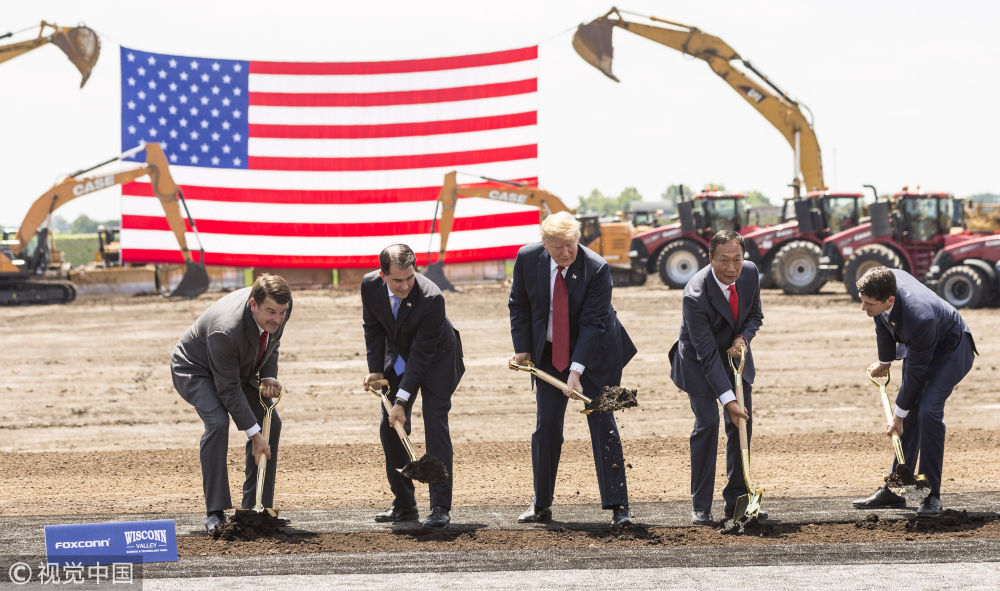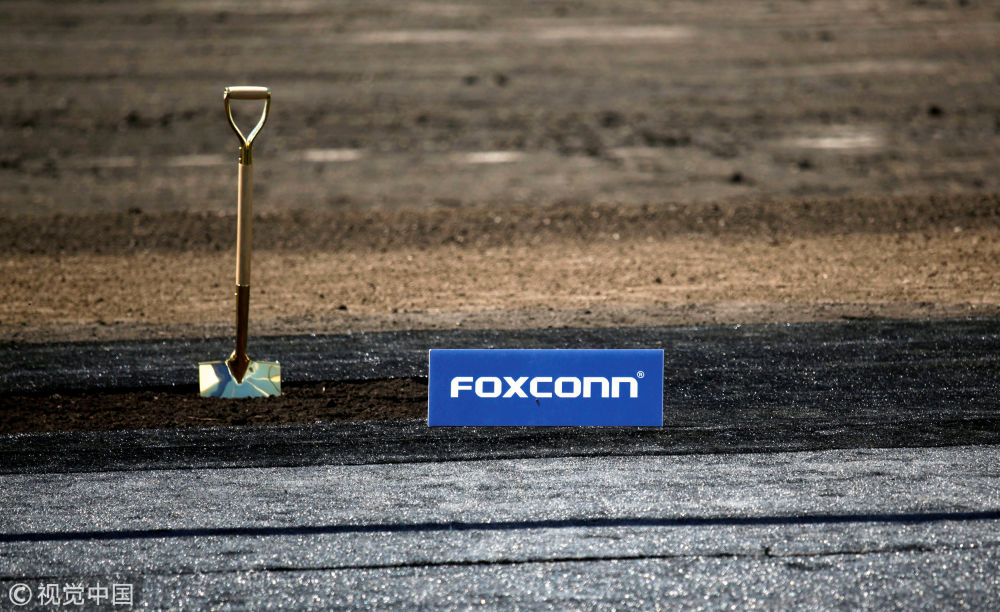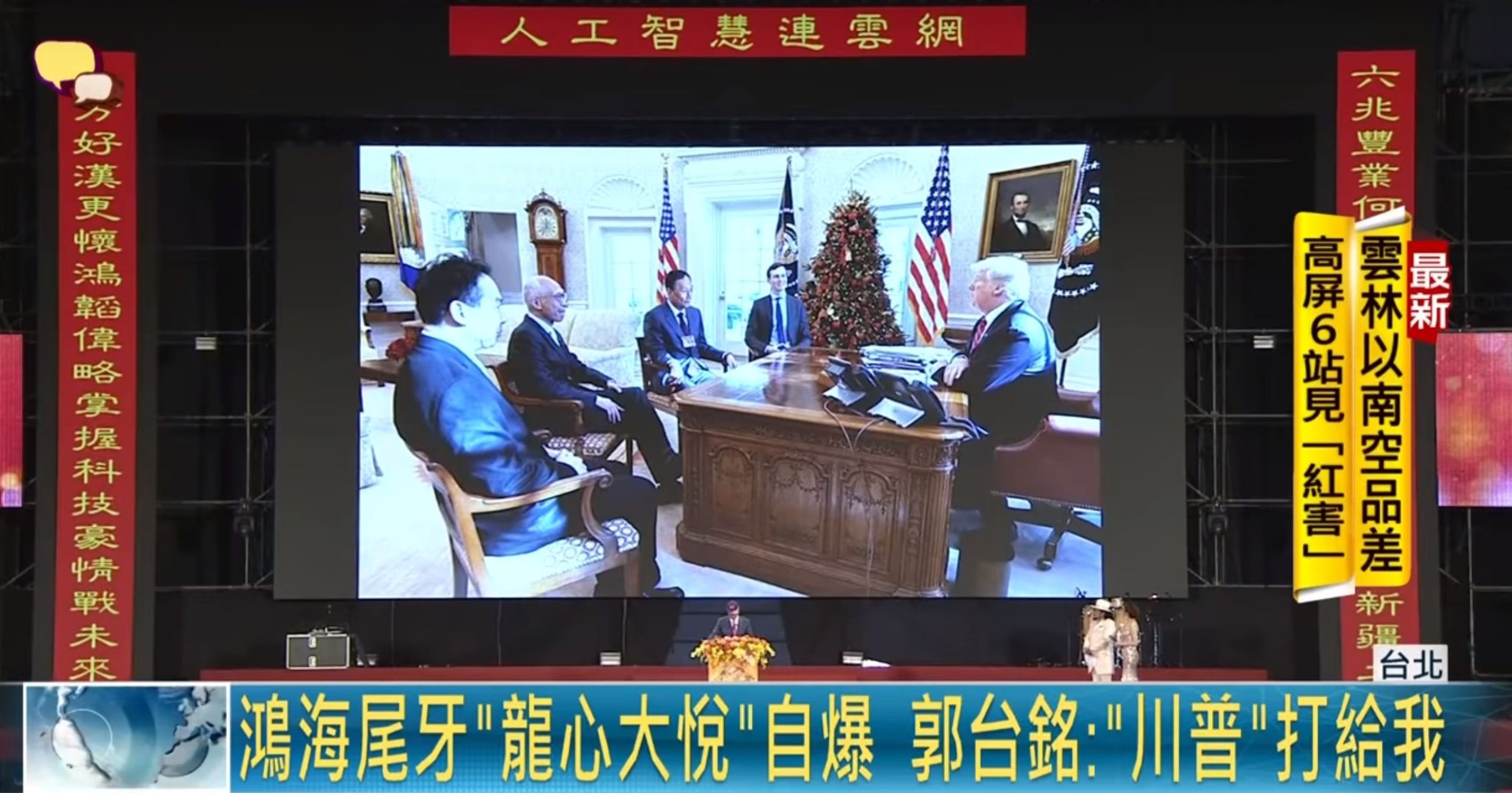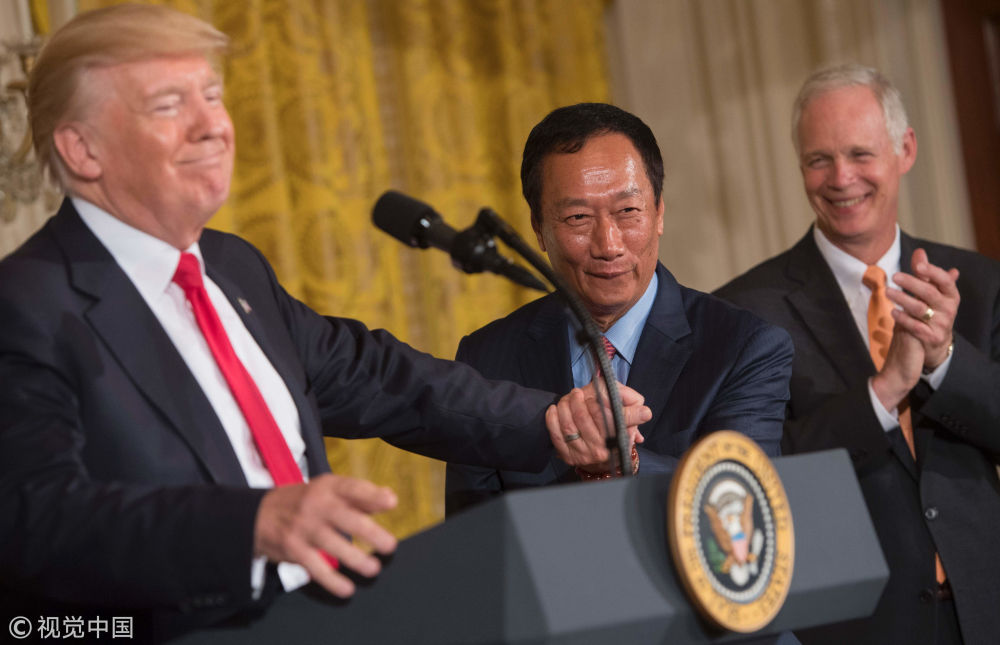The crisis of Foxconn’s "Billion American Factory" lasted for 48 hours: Trump personally called and Guo Taiming changed his mind.
A phone call from Trump to Guo Taiming successfully reversed the collapse crisis of Foxconn’s American factory, which he called "the eighth wonder of the world".
On January 30th, Hu Guohui, the special assistant of Foxconn Chairman Guo Taiming, said in an interview with Reuters that Foxconn was rethinking its plan to invest 10 billion dollars to build an LCD panel factory in Wisconsin, USA, and would shift its recruitment Louis Woo engineers and researchers, rather than the manufacturing workers originally promised in this project. The panel factory plan may be reduced or even shelved.
As soon as the relevant report was published, it caused an uproar in the United States. After all, this largest foreign investment project in the history of the United States not only claims to provide 13,000 blue-collar jobs for Weizhou in the future, but also has always been regarded by Trump as his landmark victory in revitalizing American manufacturing.
On February 1st, Guo Taiming personally released a "real hammer" at Foxconn’s annual conference in Taipei, saying that Weizhou Investment "is making some changes, avoiding mass-produced projects and adjusting to the field of research and development". However, on the evening of Beijing time, an overseas phone call from Trump personally made Guo Taiming change his attitude again.
Foxconn issued a statement later that day, saying, "The Group will build a sixth-generation panel factory in Wisconsin Valley Science and Technology Park as planned. The whole park will serve as a local high-tech advanced manufacturing center and a hub for regional innovation and technology in the future. Shortly afterwards, Trump also announced this "great news" on Twitter.
In just two days, a storm suddenly happened and unexpectedly subsided. However, the "black history" of Foxconn’s repeated changes in Weizhou and other investment projects still makes the "10 billion dollar factory" under construction look distant.

On July 26, 2017, Foxconn officially announced the plan to set up a factory in Weizhou. At the White House press conference, Trump appeared and said: "If I am not elected, he (Guo Taiming) will definitely not invest this $10 billion. This is a great day for American workers and American manufacturing. Scott Walker, then governor of Weizhou, said: "This is a once-in-a-century opportunity for our state and even the whole United States, and Wisconsin is ready. 」
In order to attract Foxconn to Weizhou, the Weizhou government offered a total of $4 billion in tax relief and a series of incentive policies. However, according to the agreement signed by the two parties, Foxconn must achieve certain goals in capital investment and job creation every year in order to obtain the policy "red envelope" of that year. In 2018, Foxconn only created 178 jobs in Weizhou, which failed to meet the requirements of 260 jobs, thus missing the tax incentives of up to 9.5 million US dollars in that year.
Initially, Foxconn planned to produce large-screen panels suitable for TV and other consumer products in Weizhou factory. However, Hu Guohui said in an interview on January 30 that the cost of manufacturing TV display screens in the United States will increase due to the relatively high labor cost in the United States, so Foxconn’s investment direction in Weizhou will change: "As far as TV is concerned, we have no foothold in the United States and we are not competitive. 」
Hu Guohui said that instead of producing LCD panels in the United States, it would be more profitable to produce them in Greater China and Japan, then ship them to Mexico for final assembly, and then import the finished products into the United States. He said that this is a supply chain that conforms to Foxconn’s current "mobile and good business model."

Hu Guohui said that Foxconn would rather set up a "technology center" in Weizhou than a manufacturing plant. He revealed that this "technology center" will mainly include research departments and packaging and assembly businesses to produce technical products used in industry, health care and other professional fields.
The focus of Foxconn’s talent recruitment in Weizhou has also shifted. Hu Guohui said that in the future, about three-quarters of Foxconn’s recruitment in Weizhou will focus on R&D and design, rather than the blue-collar manufacturing workers promised before. "In Wisconsin, we are not building a factory. You can’t look at our investment in Weizhou from the perspective of a factory. 」
On February 1st, when Guo Taiming attended Foxconn’s annual conference in Taiwan Province, he also took the initiative to mention the change of Weizhou project. Guo Taiming said that the original plan was to do mass production, but in the United States, scientific and technological innovation has a good environment, talents and educational institutions, so the plan was adjusted to the direction of technology research and development.
Guo Taiming believes that investment projects and technologies in Weizhou should be "re-examined" to meet the current global market environment and meet the needs of local and customers, but he also said that the commitment to create 13,000 jobs has not changed. However, according to some sources, Foxconn has slowed down the pace of recruitment in Weizhou. It was originally expected to employ 5,200 people locally by 2020, but this number has been greatly reduced to 1,000. As for when Foxconn can complete the goal of 13,000 jobs, it is still unknown.
On the other side of the Pacific Ocean in the United States, Hu Guohui’s remarks were published by Reuters, which caused a sensation in Weizhou and caught officials off guard.
Tony Evers, the current governor of Weizhou, said that he was "surprised" by Foxconn’s latest plan. In last year’s election campaign against former Republican Governor Scott Walker, Democrat Tony Evers has always been a critic of Foxconn’s project. He said that Foxconn’s ever-changing plans have caused him a lot of troubles, and that the state’s $4 billion incentive for Foxconn is too high.
Gordon Hintz, the minority leader of the Victorian Parliament, said that Hu Guohui’s statement was completely contrary to Foxconn’s commitment made 18 months ago to revitalize the manufacturing industry in the southeastern part of the state. "Foxconn’s every step is exaggerated and it can’t achieve its goal. For taxpayers in Weizhou, this is simply disastrous news. 」
Nate Jensen, who studies incentive policies at the University of Texas at Austin, said that in view of the fact that Victoria’s drastic policies for Foxconn are extremely expensive and Foxconn’s investment changes are reducing the selling point of middle-income jobs, Victorian government officials should consider whether to renegotiate the incentive policies with Foxconn. Gordon Hintz also pointed out that "this is not the agreement promised to Wisconsin before". He said that local and state governments have invested millions of dollars in road improvement and other infrastructure, hoping to hold public hearings on Foxconn’s agreement and any renegotiation of the state contract.
On the occasion of discussions from all walks of life, Trump came out.

On the evening of February 1st, Foxconn issued a statement confirming that Guo Taiming and Trump had just spoken by phone in person, and "after the fruitful communication between the company team and the White House officials in the past year", Foxconn will continue to promote the planned Weizhou factory. Foxconn will build a "sixth generation" factory to produce small and medium-sized LCD panels as originally planned, including TV assembly and artificial intelligence R&D center, and will further expand its investment fields. Trump then wrote on Twitter: "After I talked to Guo Taiming, Foxconn in Wisconsin had good news. 」
The next day, February 2, at Foxconn’s annual meeting, Guo Taiming revealed the specific contents of his conversation with Trump: "Yesterday, I was fortunate to receive a phone call from Mr. Trump, the president of the United States, and he called me. In fact, I also went to the White House in December last year and had a detailed talk with him about the future economy and Sino-US trade, as well as investment in the United States. President Trump not only wants me to continue to invest in the research and development and manufacturing of LCD in Wisconsin, but also for self-driving and future aerospace technology. Then he also hopes that young talents can return to the midwest from (the United States) and invest in research and development, which gives us high expectations. 」
The Taiwanese businessman also turned Foxconn’s troubles in Weizhou into a compliment to Trump: "Mr. President, the unemployment rate in Wisconsin has dropped from 5-6% to 2.9% since you took office. That is to say, I can’t find any workers at all. Trump responded that he would try his best to help.
Guo Taiming believes that the United States is the largest market in the world, with the most talents, the highest technology and the best business environment: "Investing in the United States is a completely correct decision and in line with future economic trends. 」
A phone call has solved the recent worries of Weizhou, but it is difficult to worry about it.
The Wall Street Journal said that before the Weizhou project, Foxconn had many statements about expanding manufacturing in the United States, but they were not put into practice. In 2013, Foxconn said that it might invest $40 million in Pennsylvania for manufacturing and research. In 2014, Guo Taiming said that he was studying the feasibility of establishing an advanced display manufacturing factory in the United States. So far, neither of these two ideas has made any progress.
After Trump and Guo Taiming talked, CNN still reported that some experts who have been tracking the progress of Foxconn’s Weizhou project still doubt whether Foxconn can fully fulfill everything it promised to Weizhou. Steven Deller, a professor of economics at the University of Wisconsin, laughed after learning Foxconn’s latest statement: "I think Foxconn is playing tricks. They have done the same thing to India, Brazil and Pennsylvania. They have a black history of making promises but not fulfilling them. 」
Tim Culpan, a Bloomberg columnist who has long observed Foxconn’s dynamics, believes that Foxconn’s plan to invest in panels in the United States is completely unreasonable. He believes that it is not in Victoria’s interest to be too closely related to the panel industry, because it is a highly circular and cost-sensitive industry, and even if it recruits manpower on a large scale, it may lay off a large number of employees soon. He also said that recruiting more R&D jobs in the United States is only Foxconn’s "wishful thinking" because "there are not so many talents in the United States who can set foot in these fields. 」

On January 31st, Global Times, the official media in China, published an editorial article entitled "The Foxconn Project Changed from a Big Apple to a Small Begonia, Lessons". The article wrote in a sarcastic tone that Foxconn’s investment in Weizhou "is a strange investment that is economically unprofitable only by snapping fingers without using calculators". The article sarcastically said that Foxconn can’t really put it above "love for profit" if it wants to show "love for America". "If the Victorian government refuses to pay a huge sum of real money for all this, Foxconn will really go there to open an LCD factory with the level of" the eighth wonder of the world ",just to send it a certificate from the United States, which is really a ghost. 」
From the perspective of a multinational company, Guo Taiming has his own thoughts. He said at Foxconn’s annual meeting this year: "No matter what the outcome of the future world trade war is, on the one hand, the market will be in the west, the North American Free Trade Area headed by the United States, and on the other hand, the economic zone with a population of 1.4 billion will be headed by Chinese mainland. We have made great progress and investment on both sides, and both have trained many talents. 」
The practice of "seeing ghosts" in others’ eyes may be Foxconn’s "survival rule" under the new situation, and it also once again confirms Guo Taiming’s straightforward declaration that "businessmen have no motherland, and the market is my motherland."
Reference:
Foxconn reconsidering plans to make LCD panels at Wisconsin plant
Foxconn says it will build flat screens in Wisconsin after Trump call
Foxconn Backpedals on Wisconsin Factory Plan, Shifts Focus to Research
Head Figure Source: vision china
Editor in charge: Song Desheng